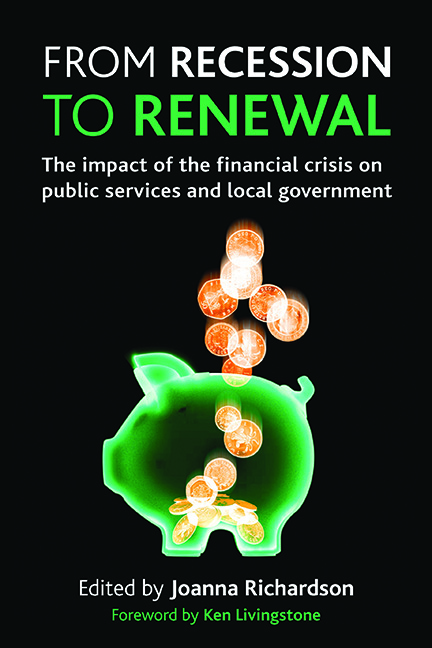 From Recession to Renewal
From Recession to Renewal three - Financial crises, governance and cohesion: can governments learn up?
Published online by Cambridge University Press: 01 September 2022
Summary
The sub-prime crisis of 2007 and the crash of global financial markets in 2008 were caused by a neoliberal apotheosis of markets, as if, godlike, they were all-knowing. Theories of ‘efficient markets’ and ‘rational expectations’ premised that investors had perfect information, despite no one knowing for months after the crisis how much had been lost by whom, how or where. US Treasury Secretary Larry Summers had cut the reserve requirements of banks to less than 2% and in 1999 repealed the New Deal Glass–Steagall Act, which had separated commercial banking from speculative finance. Federal Reserve chair Alan Greenspan had cut interest rates to near 1% in reaction to the bursting of the dot. com bubble and the risk of a recession in the US (Tett, 2009). This deregulation and near-costless borrowing turned banks which should have been safe havens for savings into casinos.
But nothing was learned up from the dot.com bubble itself, or the collapse the year before the repeal of Glass–Steagall of the Long Term Capital Management hedge fund, founded by two of the economists who had gained Nobel laureates for their contributions to rational expectations theory. Claims for ‘creative financial engineering’ continued apace through ‘derivatives’, which should have been derived from assets but were not, since they were sold through ‘structured investment vehicles’, which were structured only in name, since they were ‘off balance sheet’ and not covered even by the minimal assets by then required of banks.
When the sub-prime crisis broke and caused a ‘credit crunch’ in inter-bank lending this prompted no less than 390 European banks to call for injection of funds from the European Central Bank and the Bank of England, followed by either public shareholdings or outright nationalisations. Their salvage and that of banks in the US was to cost $3 trillion, or more than double the GDP of the US. In August 2008 world stock markets crashed by up to a quarter. After the crash, the European Commissioner for Competition Policy, Nellie Kroes, held bilateral meetings with the chief executives of major banks and reported that most of them ‘were in denial, claiming that “their bank” had no problems – only others did’ (Kroes, 2009).
- Type
- Chapter
- Information
- From Recession to RenewalThe Impact of the Financial Crisis on Public Services and Local Government, pp. 51 - 70Publisher: Bristol University PressPrint publication year: 2010


